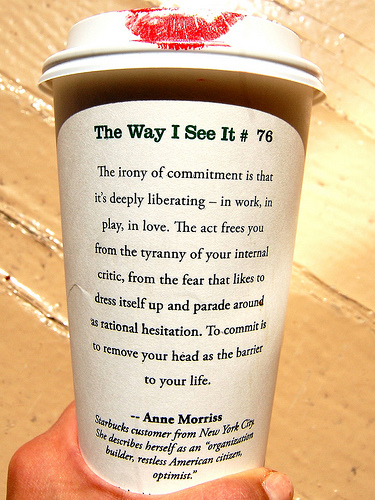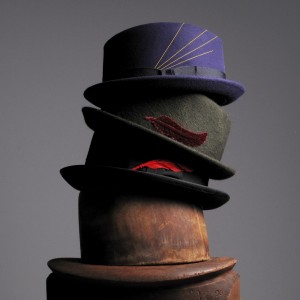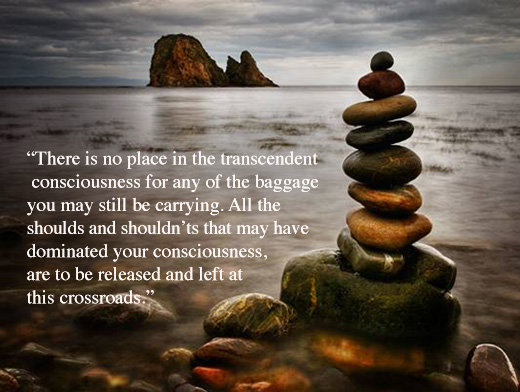
Last week, two posts popped up in my Google Reader that I couldn’t ignore. Sometimes it seems like my Google Reader is conspiring to read my mind, shake it up and tell me everything will be OK. Clearly, this is not the case. It is just that sometimes we notice things more frequently when they are fresh on our mind or we are primed. It is like a mix of confirmation bias, pareidolia, and the availability heuristic. Are you still with me?
Julie from Escape the Ivory Tower wrote the first post that caught my eye. She wrote, Moving Beyond Talent and Skill, which is the first in a great series of posts. She talks about how so many people on the Internet seem to know everything about finding one’s “calling” in life. People think all you need to do is make a list of your talents and skills or to write down the things that are easy for you. I love that she says, “If finding your calling were that simple, no one would have to search the damn web for help, because they would be long done with that process.” I wholeheartedly agree. If something comes naturally for us, she says, it may be confused with what will make us happy. I absolutely love learning about skincare and makeup and could talk to you about it for hours. I know a lot about both. Based on my sales as a makeup consultant and on feedback from friends, I am good at it. I have a makeup artist license. I would be a spa manager today if I had not come to grad school. I was incredibly, utterly, abysmally unhappy in my work. Julie reiterates that limiting one’s “calling” to one’s natural talent “confuses talent with training,” “limits us to what we’ve already done,” and “focuses on career to the exclusion of life.” More importantly, we need to ask ourselves about our passions, values and our ideal life.
Cate touched on that last point in her post Defining Dreams: “What does my ideal look like?” She cites Randy Pausch’s Last Lecture and talks about some of her own dreams. What struck me most was that she mentions how we have to commit to big dreams and how commitment can be a scary prospect.
I will be in school, at the very least, for another four years. If I do post-doc work as most people do in my field, it will be more like six years. Lately, I’ve questioned why I put myself through what at times feels like torture. I’m 30 pounds overweight, I’m usually exhausted, I’m behind on my thesis, I will have tens of thousands of dollars in student loan debt and I can’t ever seem to remember who wrote what in what year in what empirical journal. I’ve been pondering how I came to be in grad school in the first place and why I am studying something about which I knew nothing before moving to Virginia Beach. I was going to be a Social Psychologist or a Sociologist when I graduated college. I was going to sit in my Ivory Tower, pondering and learning more about humans within a group context. What they study is very different from what I study now. They don’t do modeling and simulation or know how to calculate various anthropometric measurements. They don’t need to know there are 40 million olfactory receptor neurons or how the eye actually works or why there are human performance differences depending on whether interfaces employ tactile or auditory feedback. They don’t need to know anything about Naval architecture or the physics behind shock mitigating seats. They won’t ever read entire textbooks about decision making under stress or the physiological side effects of motion sickness. They will certainly never need to worry about Mauchley’s sphericity assumption or have to explain why they are using a (insert explicative) structural equation model. I learn about these things every day now. I am not naturally talented or gifted with statistics, physiology, modeling and simulation or engineering. So why am I willing to dedicate my life to these things for the rest of my life?
I graduated college with my BS in 2005 and took off what was supposed to be a semester. That semester turned into three years because life happened as it often does. I studied for the GRE (and bombed it) as my long-term relationship fell apart. My research interests shifter further from Social Psychology and closer to Organizational Psychology as I switched from a retail job to a supervisor position in a spa. I fell in love with the wrong guy as I moved in with my mom. I took the GRE again as I applied to 20 graduate programs all over the country. I still remember the week I found out that my boss was leaving and she wanted me to take her place. I had already begun to receive acceptance letter after phone call after interview invitation. I decided to quit what most would consider a stable, lucrative job opportunity in the health and beauty industry to go to grad school. I started with a Master’s program to get my feet wet in academic waters, but I *knew* I was going to be an Industrial/Organizational Psychologist whose research focus involved video game-based training for distributed teams and the implementation of personality measures for team selection. My advisor happened to run a lab that conducts both I/O and Human Factors research. I used a first person shooter computer game for a research project. I took a course in Personnel psychology and a course in Human Factors. And the rest, as they say, is history. I was officially, without a doubt, head over heels a member of The Dark Side (as we jokingly call Human Factors in a program with an equal number of I/O and HF students).
So there I was, a first year graduate student launching myself head first into a discipline about which I had no experience or background knowledge. There I was, pushing myself, freeing myself from fear and the Unknown, challenging myself and committing myself to this path. Committing. Commitment. I was free because I made a commitment to grad school and to this discipline. I made a commitment to my ideal life, my core values and my passion for making a difference in others’ lives. I had limited myself to those things for which I was naturally talented and the things that came easily to me instead of things I might learn along a more challenging path. If I hadn’t come to grad school, I would never know this discipline I love so much even existed. My passion for making a difference in even one person’s life has come to fruition in ways I never expected. I am happier and more fulfilled than I have ever been.
It is not easy to make this kind of commitment. I want to give up all the time (usually at 4am when I’m sleep deprived and have a an exam for which I’m prepared). I question if I made the right decision because I am not perfect and don’t have all the answers. I’m still on my own journey, figuring it all out as I go along. On the other hand, this beats the hell out of the life I was living before grad school. Maybe it is, in fact, easier because I chose this path and I am committed to it wholeheartedly.
~~~~~~~~~~
Image – Emerging Artist
Quote (a favorite of mine for a few years) – Anne Morriss


